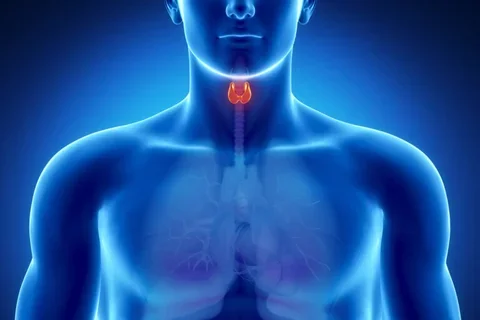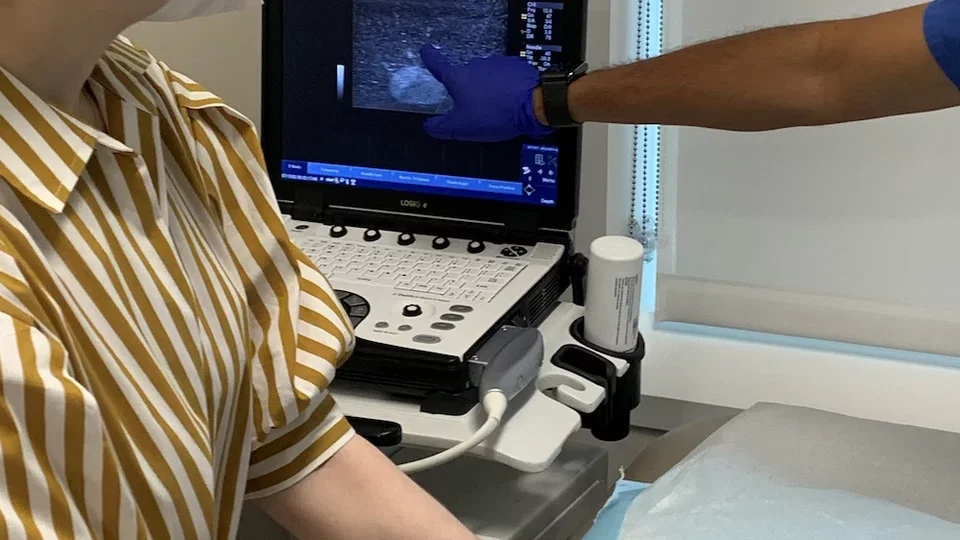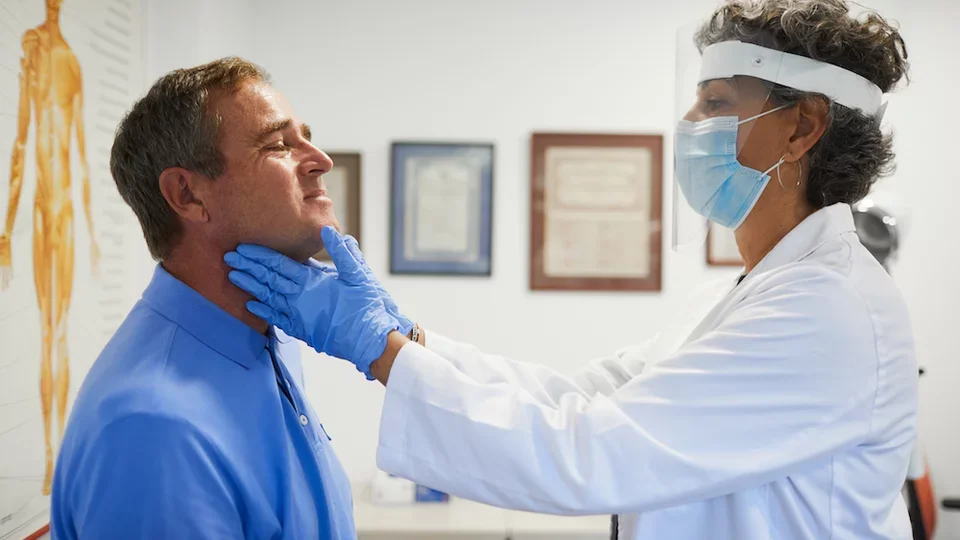Hypothyroidism vs Hyperthyroidism - What's The Difference?
Medical Expert Interview

In This Article:
- Hypothyroidism Definition
- Hypothyroidism Causes
- Hypothyroidism Symptoms
- Hypothyroidism Diagnosis
- Hypothyroidism Treatment
- Hyperthyroidism Definition
- Hyperthyroidism Causes
- Hyperthyroidism Symptoms
- Hyperthyroidism Diagnosis
- Hyperthyroidism Treatment
Meet Dr. Stephanie Smooke Praw
“At the end of the day, medicine is about getting to know people, and through getting to know them, hopefully being able to help them.”
Dr. Smooke Praw knew she wanted to become a doctor when she was still in elementary school: “I had a really inspirational teacher—Mr. Norman Cagle—who introduced me to science,” she remembers fondly. “And I loved that when you were learning about science, things made sense.”

Originally intent on a career in pediatric medicine, Dr. Smooke Praw ended up choosing endocrinology because the specialty is unique in its ability to impact a wide variety of patients: “As an endocrinologist, you deal with a really broad group of illnesses and diseases and disorders that affect patients from the age of 18 to the age of 100 plus,” she explains. “I also find the feedback loops—the pathophysiology—really fascinating. By replacing a hormone or lowering a hormone that the body is producing on its own, you can really make a huge difference in terms of how someone is feeling.”
However, Dr. Smooke Praw is much more than a clinical endocrinologist. She’s also a David Geffen School of Medicine at UCLA (DGSOM) associate professor, the interim Clinical Co-Chief of Endocrinology, the Endocrinology Fellowship program director, director of education for the Division of Endocrinology, and director of the new UCLA Health Thyroid Center.
And it’s the combination of these roles that she likes best about her work at UCLA: “I get to interact with patients as well as with learners, including our medical students, our residents, and our fellows. I get to interact with a multidisciplinary team of physicians who are at the top of their field. And I also get to interact regularly with our researchers who are making so many important advances in our specialty.”
What Is the Thyroid? What Does It Do?
“The thyroid is a small butterfly shaped organ that sits just at the base of the neck,” explains Dr. Smooke Praw.
It’s only 4-6 centimeters wide and 2-3 centimeters tall, but this little organ is a metabolic powerhouse: “It affects several different functional processes in the body via the production of thyroid hormones.”
These thyroid hormones—thyroxine (T4) and triiodothyronine (T3)—influence the metabolic rate of cells throughout the body, which in turn has a role in an individual’s energy levels, affects their weight, and regulates their body temperature.
Thyroid function is tightly controlled by the pituitary gland and the hypothalamus through a feedback loop involving thyroid-stimulating hormone (TSH). If there is an imbalance in thyroid hormone production, it can lead to hypothyroidism or hyperthyroidism.
What Is Hypothyroidism?
“Hypothyroidism is having an under-active thyroid or a thyroid that is not able to produce enough hormone.”
What Causes Hypothyroidism?
The most common cause of hypothyroidism is an autoimmune condition called Hashimoto's Thyroiditis, where the immune system attacks the thyroid gland. “Hashimoto’s causes inflammation, which then results in scarring and fibrosis within the thyroid, which reduces hormone production.”
Other causes include:
- Iodine Deficiency: Insufficient iodine in the diet can lead to hypothyroidism.
- Treatment for Hyperthyroidism: Certain treatments for an overactive thyroid (hyperthyroidism) can result in hypothyroidism.
- Thyroid Surgery: Removal of a part or all of the thyroid gland can lead to reduced hormone production.
- Certain Medications: Some medications, such as lithium, amiodarone, tyrosine kinase inhibitors, and thalidomide, can interfere with thyroid function. Checkpoint inhibitors for different cancers can also impair the thyroid.
“There is also a group of people where thyroid function is abnormal but we're not able to identify the exact cause.”
What Are the Symptoms of Hypothyroidism?
The symptoms of hypothyroidism can vary but may include:
- Fatigue and weakness
- Weight gain
- Cold intolerance
- Dry skin and hair
- Constipation
- Depression
- Menstrual irregularities
“Someone with an under-active thyroid might feel more tired, more cold, more sluggish, more depressed, or more constipated than usual. And they might find that they're gaining weight more easily.”
However, Dr. Smooke Praw is quick to point out that these symptoms are not specific to an under-active thyroid: “All of these symptoms and signs can also be caused by other things. So we need the blood test—which is highly accurate—to match up with the symptoms in order to blame the thyroid.”
How Is Hypothyroidism Diagnosed?
Hypothyroidism is diagnosed through blood tests that measure levels of thyroid hormones (TSH, T4). Abnormal levels of thyroid-stimulating hormone (TSH) along with low levels of T4 can indicate hypothyroidism.
Antibody tests may also be performed to check for autoimmune thyroid disorders: “If hypothyroidism is confirmed, and the patient has an abnormal TSH, the doctor may order additional testing for Hashimoto's Thyroiditis, and that could include a thyroid peroxidase antibody (TPO antibody) and a thyroglobulin antibody (TG antibody) test.”

How to Treat Hypothyroidism
Hypothyroidism is typically treated with thyroid hormone replacement therapy. The most common medication is levothyroxine, a synthetic form of T4. The goal of treatment is to restore normal thyroid hormone levels in the body, alleviating symptoms and preventing complications.
However, it’s important that patients follow their doctor’s instructions when taking their medication:
“Thyroid medication needs to be taken properly in order to do its job because the absorption of that medication can be affected by a lot of different factors,” explains Dr. Smooke Praw. “We typically recommend that patients take their medication on an empty stomach—either first thing in the morning or late at night—and they wait 30 minutes before eating or drinking coffee. Then they wait an additional 4 hours before taking supplements that contain iron, fiber, calcium, multi-vitamin, or soy.”
“There are also some other medications—such as acid blocking medications—that can impact the absorption of thyroid medication. So the doctor might provide some additional instruction about those.”
Patients taking thyroid medication may also need periodic adjustments to their dosage based on blood tests and their response to treatment.
What Is Hyperthyroidism?
“Hyperthyroidism is having an overactive thyroid gland or having too much thyroid hormone in the body.”
What Causes Hyperthyroidism?
“One of the most common causes of hyperthyroidism is Graves’ Disease, which is an autoimmune condition that can over-stimulate the thyroid.”
Other causes include:
- Toxic Nodules or Autonomously Functioning Nodules: The presence of nodules in the thyroid gland that produce excessive hormones.
- Thyroiditis: Inflammation of the thyroid gland can cause the release of stored hormones, leading to temporary hyperthyroidism.
- Excessive Iodine Intake: Consuming too much iodine, whether through diet or medications, can contribute to hyperthyroidism.
- Certain Medications: There are also medications that can cause hyperthyroidism, such as amiodarone, which is a used to treat heart arrhythmias. “Because it introduces a really big iodine load, and iodine is essentially food for the thyroid, it can cause overactivity.”
- Too Much Levothyroxine: “Sometimes patients with hypothyroidism take too much thyroid medication, which can cause their TSH levels to be suppressed.”
What Are the Symptoms of Hyperthyroidism?
The symptoms of hyperthyroidism can vary but may include:
- Weight loss
- Increased appetite
- Nervousness or anxiety
- Irritability
- Restlessness
- Heat intolerance
- Sweating
- Fatigue
- Tremors
- Sleep disturbances
- Irregular menstrual periods
- Enlarged thyroid gland (goiter)
- Thyroid inflammation (thyroiditis) and tenderness
- Frequent bowel movements
- Eye problems (Graves' ophthalmopathy)
“Hyperthyroidism can make it feel like everything is running on overtime,” says Dr. Smooke Praw. “Patients might feel like their heart is racing all the time or their hands are shaking. They feel warmer than usual, more anxious than usual, their bowels may be looser and more frequent, they may lose weight a little bit more easily.”
“But it can be really easy to out-eat the increase in metabolism that comes with hyperthyroidism,” cautions Dr. Smooke Praw. “So not everybody with a hyperactive thyroid loses weight.”
How Is Hyperthyroidism Diagnosed?
“Much like with hypothyroidism, if someone is having symptoms that they think could be consistent with hyperthyroidism, they should be seen by their doctor and have their thyroid levels checked.”
Common blood tests include measuring levels of thyroid-stimulating hormone (TSH), T4, and T3. In hyperthyroidism, TSH levels are typically low, while T4 and T3 levels are elevated.
Additional tests, such as thyroid ultrasound, radioactive iodine uptake (RAIU) scans, or thyroid antibody tests, may be performed to identify the underlying cause of hyperthyroidism.
“Depending on the results of those and depending on the diagnosis, that's how the treatment is determined.”

How to Treat Hyperthyroidism
Treatment for hyperthyroidism aims to normalize thyroid hormone levels and alleviate symptoms. “However, the treatment for hyperthyroidism is a lot less straightforward and there are a lot more options. For example, if it's caused by thyroid inflammation (thyroiditis), the condition will likely resolve on its own versus other conditions that may require anti-thyroid medication, radioactive iodine ablation, or even surgery.”
Ultimately the choice of treatment depends on the cause and severity of the condition:
- Antithyroid Medications: Medications such as methimazole or propylthiouracil (PTU) can block the production of thyroid hormones.
- Radioactive Iodine Therapy: Radioactive iodine is used to destroy the thyroid tissue, reducing hormone production.
- Thyroidectomy: Surgical removal of part or all of the thyroid gland may be recommended in certain cases.
- Beta-Blockers: Medications like propranolol may be prescribed to alleviate symptoms such as rapid heart rate and tremors.
Treatment decisions are often made in consultation with an endocrinologist based on the specific circumstances of the individual. It's important to manage hyperthyroidism in order to prevent complications such as heart problems, osteoporosis, and thyroid storm (a severe, life-threatening form of hyperthyroidism). Regular follow-up care and monitoring of thyroid function are essential for ongoing management.
Thyroid Awareness Month
Thyroid disorders, including hypothyroidism, hyperthyroidism, and thyroid cancer, affect a significant number of people worldwide. Thyroid Awareness Month—held annually in January—serves as a platform to address the impact of these disorders on individuals' lives, promote early detection, and emphasize the importance of proper management and treatment.
Think You Have a Thyroid Disorder? Here's What You Need to Know...
In honor of Thyroid Awareness Month, Dr. Smooke Praw has three key takeaways she wants people to keep in mind when addressing thyroid disorders:
#1 - Be Wary of Thyroid Diet Plans
“When it comes to diet, there's a lot of misinformation—or areas where information is limited,” warns Dr. Smooke Praw. “For instance, patients with Hashimoto’s often read that they need to be gluten free, avoid nightshades (like eggplant and tomatoes) or walnuts or cruciferous vegetables. We don’t have great data to support any of those claims.”
“When it comes to iodine, people should maintain normal daily iodine levels, which is 150 micrograms per day for a non-pregnant person—more, if they're pregnant or nursing. Other than that, what I typically tell my patients is: if there's a food that doesn't make you feel good when you eat it, don't eat it. But you don't need to be gluten free if you have thyroid disease.”
#2 - Don’t Hesitate to Get Checked Out
“I would encourage people who are having symptoms that don't feel right or feeling like something is changing in their body, to go to their primary doctor and get checked,” says Dr. Smooke Praw. “If they have symptoms that seem consistent with either an over- or under-active thyroid, their primary doctor can check their thyroid levels with bloodwork.”
Request An Appointment
“If we do a test, and it does happen to be the thyroid, that's great, we can fix it. But if that thyroid level doesn't match up with the symptoms, then we can't blame the thyroid…”
#3 - Be Open Minded and Don’t Give Up
“We all want so badly to have an answer when we are not feeling well. But sometimes thyroid function is not the culprit. We need to keep an open mind and be ready to work through those symptoms if there's not an answer that is thyroid-related, especially because those symptoms can be highly nonspecific.”
“For example, it might not be a thyroid condition that's causing someone's fatigue. It might end up being a cardiac condition, a pulmonary condition, or even some kind of intrinsic mood dysfunction, like depression or anxiety.”
“Or perhaps there are lifestyle choices that need to be investigated. So many of us don't sleep enough. We have stressful lives and stressful jobs. And we might be taking care of everybody else in our lives before we take care of ourselves, and we end up feeling run down. Maintaining an open mind towards that is really, really important.”
“So if the thyroid function testing is normal, then other causes for symptoms should be explored. That would be my biggest takeaway.”
"At UCLA Health, our team of specialists provides expert thyroid care. Our physicians are at the forefront of thyroid disease and thyroid cancer management."
Why Choose UCLA Health for Thyroid Care?
The UCLA Health Thyroid Center has a history of excellence and innovation in the treatment of thyroid disease. Our physicians provide exceptional clinical care, help establish treatment guidelines, conduct research, and train the next generation of physicians.
Highlights of our program include:
- Recognized Expertise
- A Team-Based Approach
- Convenient Access
- Care Coordination
- Research Focus



